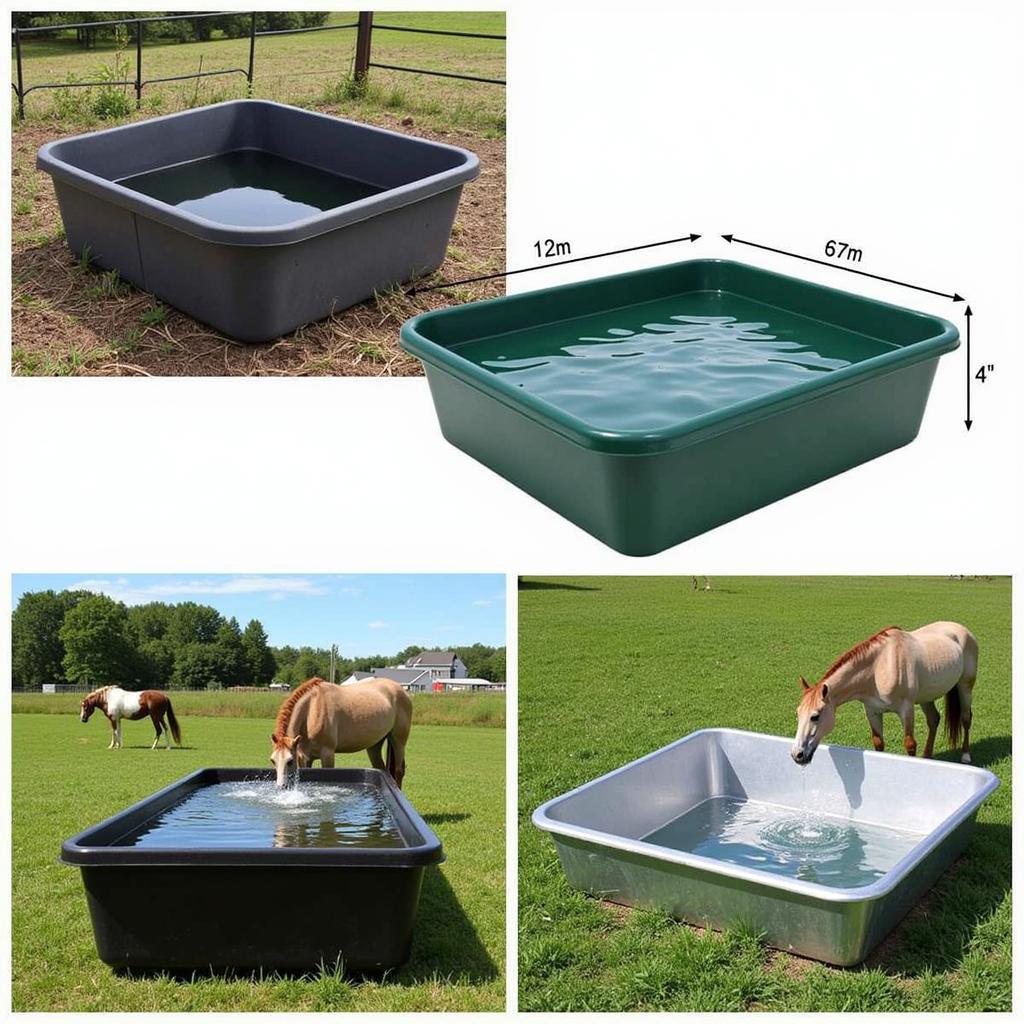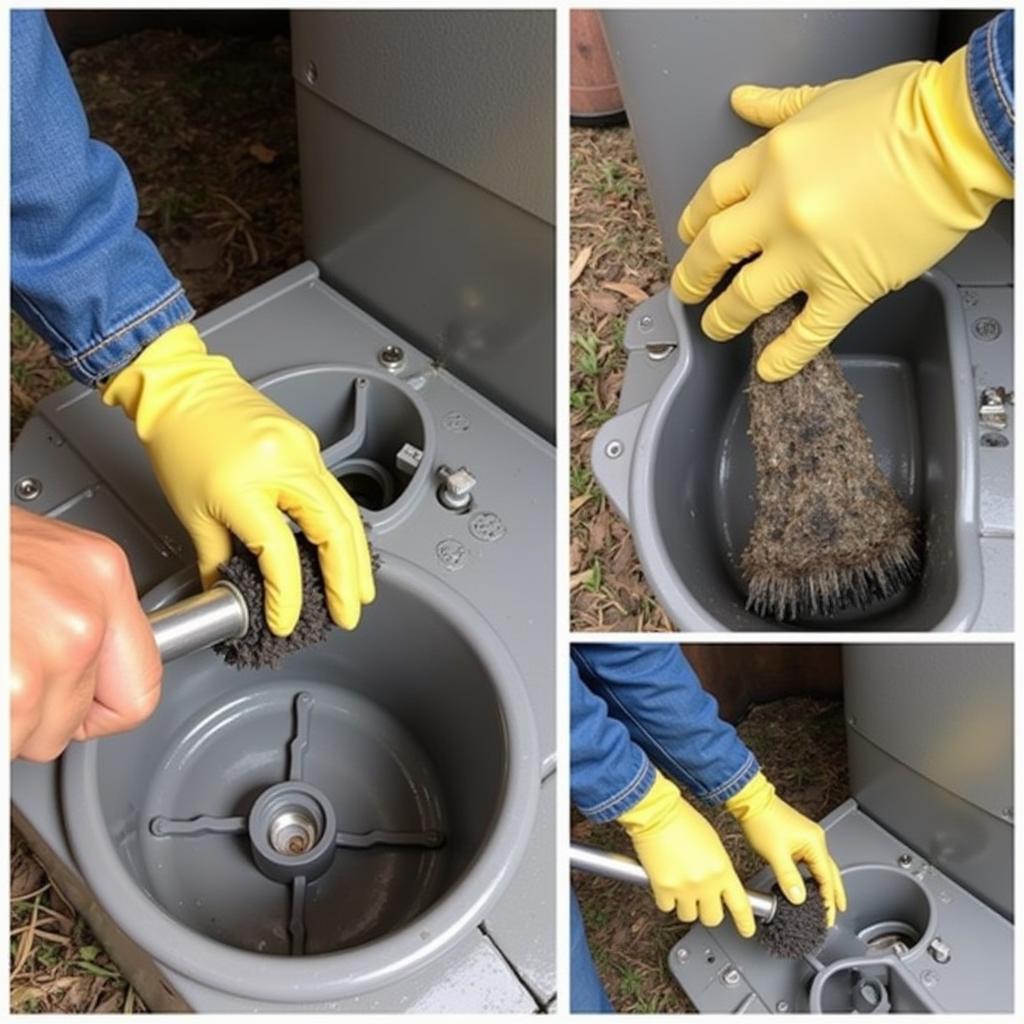Keeping your horse’s water trough clean is crucial for their health and well-being. A dirty trough can harbor harmful bacteria and algae, leading to illness and a reluctance to drink, which can cause dehydration. This guide will walk you through the best practices for how to keep a horse trough clean, ensuring your equine companion has access to fresh, clean water at all times.
Why is a Clean Water Trough So Important?
Clean water is essential for a horse’s digestive health, temperature regulation, and overall performance. A dirty trough can be a breeding ground for bacteria like E. coli and Salmonella, as well as algae, which can produce toxins. These contaminants can cause digestive upset, colic, and other health problems. Furthermore, horses are naturally sensitive to the taste and smell of their water. A dirty trough can deter them from drinking enough, leading to dehydration, especially in hot weather.
The Best Way to Clean a Horse Trough
Cleaning a horse trough doesn’t have to be a chore. With a regular routine, you can easily maintain a clean and healthy water source for your horses. Here’s a step-by-step guide:
- Daily Cleaning: Remove any debris, such as hay, leaves, or insects, from the trough using a net or your hand. Top off the water level as needed. This quick daily check helps prevent the build-up of grime and keeps the water fresh.
- Weekly Scrubbing: Empty the trough completely at least once a week. Use a stiff brush and a mild detergent specifically designed for animal use. Avoid using harsh chemicals like bleach, which can be toxic to horses. Scrub the entire surface of the trough, paying attention to corners and crevices where algae and bacteria tend to accumulate. Rinse thoroughly with clean water until all traces of soap are gone.
- Monthly Deep Cleaning: Once a month, perform a more thorough cleaning. This includes scrubbing the trough as described above, but also disinfecting it. You can use a diluted bleach solution (1 part bleach to 10 parts water), ensuring you rinse extremely thoroughly afterwards. Alternatively, you can use a commercially available trough cleaner designed for horse use.
Different Types of Horse Troughs and Their Cleaning Requirements
Different trough materials require slightly different cleaning approaches. Here’s a breakdown:
Plastic Troughs:
Plastic troughs are popular due to their durability and affordability. They are relatively easy to clean with a brush and detergent. Avoid using abrasive cleaners or tools, which can scratch the surface and make it more susceptible to bacterial growth.
Rubber Troughs:
Rubber troughs are also durable and less likely to crack in freezing temperatures. They can be cleaned similarly to plastic troughs.
Metal Troughs:
Metal troughs are sturdy but can rust over time. Ensure they are galvanized or coated to prevent rust. Use a non-abrasive cleaner to avoid damaging the coating.
 Various types of horse troughs
Various types of horse troughs
Concrete Troughs:
Concrete troughs are long-lasting but can be porous, making them harder to clean thoroughly. Regular scrubbing and occasional disinfection are crucial.
Preventing Algae Growth in Horse Troughs
Algae growth is a common problem in horse troughs, especially during warmer months. Here are a few tips to prevent it:
- Keep the trough in the shade: Direct sunlight promotes algae growth. Positioning the trough in a shaded area can significantly reduce algae blooms.
- Use an algae inhibitor: There are safe and effective algae inhibitors available for horse troughs. Follow the manufacturer’s instructions carefully.
- Regular cleaning: As mentioned above, regular cleaning is the best way to prevent algae from taking hold.
What About Automatic Waterers?
Automatic waterers offer a convenient way to provide a constant supply of fresh water. However, they still require regular cleaning. Follow the manufacturer’s instructions for cleaning and maintenance.
 Cleaning an automatic horse waterer
Cleaning an automatic horse waterer
Keeping Your Horse Hydrated: The Importance of Clean Water
“Clean water is as vital to a horse’s health as good quality hay,” says Dr. Emily Carter, DVM, an equine veterinarian with over 20 years of experience. “A clean trough encourages regular drinking, which is essential for preventing dehydration and maintaining optimal health.” Providing clean, fresh water is a simple yet crucial aspect of horse ownership.
Conclusion
Keeping your horse trough clean is a vital part of responsible horse care. By following the steps outlined in this guide, you can ensure your horse has access to fresh, palatable water, contributing to their overall health and well-being. Remember, how to keep a horse trough clean is not just about aesthetics; it’s about providing the best possible care for your equine companion.
FAQs
- How often should I clean my horse trough? Daily debris removal, weekly scrubbing, and monthly deep cleaning are recommended.
- Can I use bleach to clean my horse trough? Yes, but use a diluted solution (1:10 ratio) and rinse extremely thoroughly. Commercial trough cleaners are also available.
- How can I prevent algae growth in my trough? Keep the trough in the shade, use an algae inhibitor, and maintain a regular cleaning schedule.
- What type of brush should I use to clean my trough? A stiff-bristled brush is ideal for scrubbing away algae and grime.
- Do automatic waterers need cleaning? Yes, they still require regular cleaning according to the manufacturer’s instructions.
- Why is my horse not drinking from the trough? A dirty trough, foul-tasting water, or a new location can deter a horse from drinking. Ensure the water is clean and fresh.
- What are the signs of dehydration in horses? Signs include lethargy, dry gums, sunken eyes, and decreased urination.
Common Situations and Questions:
Scenario: You notice a slimy film on the surface of your horse’s water trough. Question: What is this, and how do I deal with it? Answer: This is likely algae. Empty the trough, scrub it thoroughly, and consider using an algae inhibitor.
Scenario: Your horse refuses to drink from a newly installed water trough. Question: How can I encourage them to drink? Answer: Try adding a small amount of apple juice or molasses to the water to make it more appealing. Ensure the trough is in a comfortable and accessible location.
Other Resources on Justus Horses USA:
- Check out our article on horse hydration for more tips on keeping your horse properly hydrated.
- Browse our selection of high-quality horse troughs and automatic waterers in our online store.
Need Help? Contact Us!
For any questions or assistance, please contact us:
Phone: 0772127271
Email: [email protected]
Address: QGM2+WX2, Vị Trung, Vị Thuỷ, Hậu Giang, Việt Nam.
We have a 24/7 customer service team ready to help.